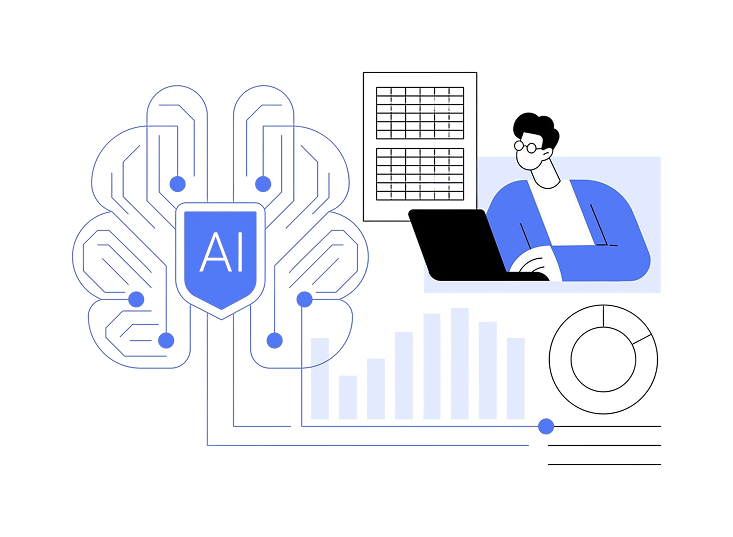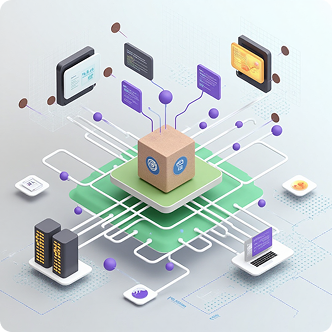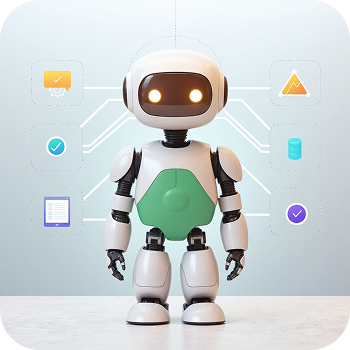AI Strategy
Consulting Services

Our Core AI Consulting Services
- Custom models for text, images, and multimodal content.
- Fine-tuned solutions for industry-specific accuracy.
- Seamless integration into workflows and systems.
- Conversational assistants and AI-driven content.


- Agents to automate tasks and boost productivity.
- Integration with CRMs, ERPs, and enterprise tools.
- Context-aware interactions trained on your data.
- Multi-agent systems for complex workflows.
- Governance frameworks for ethical AI adoption.
- Risk checks for privacy, bias, and security.
- Compliance with GDPR, HIPAA, and EU AI Act.
- Transparency through explainable, monitored AI.

How We Use AI in Our Services




Industries We Support
- Practical AI Strategy – We don’t just experiment; we align AI with measurable business goals.
- Cross-Industry Expertise – Proven use cases across healthcare, finance, manufacturing, logistics, retail, and more.
- Responsible Adoption – Governance, transparency, and compliance baked into every solution.
- End-to-End Capability – From strategy to deployment, integration, and continuous improvement.
Automated anomaly detection and consistent execution.
Frequently Asked Questions
Best practices include:
- Establishing clear AI governance frameworks to assign accountability and oversight
- Embedding ethical AI principles such as fairness, transparency, privacy, and inclusivity
- Conducting regular risk assessments for data bias, security vulnerabilities, and compliance gaps
- Making AI decisions explainable and auditable for regulators and users
- Ensuring human oversight remains integral in critical AI-driven processes
- Aligning with global AI regulations including GDPR, HIPAA, and the EU AI Act
- Training teams to maintain a culture of responsible AI use and continuous monitoring to adapt to evolving risks.
Learn More about AI Strategy and Adoption
Discovery & Assessment
- Evaluate current data assets, technology infrastructure, and AI readiness.
- Identify business needs and opportunities through workshops, interviews, and data audits.
- Use frameworks like Gartner’s AI Maturity Model or BCG’s ASPIRE index to benchmark capabilities.
- Assess governance structures and define success metrics such as KPIs aligned with business objectives.
Strategic Roadmap Development
- Prioritize AI initiatives based on impact, feasibility, and alignment with overall business strategy.
- Define clear AI objectives, success criteria, and resource requirements.
- Develop a detailed project charter and implementation timeline.
- Establish AI governance frameworks addressing ethics, compliance, and risk management.
Solution Design & Deployment
- Architect tailored AI solutions selecting appropriate models and algorithms.
- Prepare and process necessary data for model training and validation.
- Develop prototypes or proof of concepts to validate approaches and gather stakeholder feedback.
- Deploy AI models integrated with existing business systems and workflows.
- Use agile practices with iterative sprints for continuous improvement and flexibility.
Scaling & Optimization
- Expand AI solutions across multiple business units or geographies.
- Build shared infrastructure and platforms to support scaling of AI initiatives.
- Embed AI into core business processes for seamless integration and automation.
- Continuously monitor AI models for performance, bias, and compliance; retrain as needed.
- Use real-time analytics to fine-tune solutions and maximize business impact.
Governance & Compliance
- Implement robust AI governance policies covering ethical AI use, data privacy, and regulatory compliance (e.g., GDPR, HIPAA, EU AI Act).
- Maintain transparency and explainability of AI decisions for users and regulators.
- Conduct ongoing risk assessments and audits to identify and mitigate potential issues.
- Establish oversight committees or AI governance boards with clear accountability.
Change Management Focus
- Engage key stakeholders early and maintain transparent, ongoing communication.
- Educate teams on AI benefits, risks, and responsible AI practices to build trust and adoption.
- Address cultural shifts toward data-driven decision making and AI-enabled workflows.
- Embed AI tools into existing systems to minimize disruption and maximize user acceptance.
- Use feedback loops and training programs to encourage continuous learning and improvement.
Developing an AI strategy is not just about adopting new technologies but about reshaping the way an organization operates and makes decisions. By following a structured methodology that spans discovery, roadmap creation, solution design, scaling, and governance, businesses can ensure that AI initiatives are both impactful and sustainable. Change management plays an equally critical role, helping teams embrace AI with confidence and aligning cultural shifts with business priorities. When strategy and change management go hand in hand, organizations are better positioned to unlock the full potential of AI, mitigate risks, and create long-term competitive advantage.
AI in Healthcare
analysis to automating clinical documentation with NLP, hospitals can improve diagnostic accuracy while reducing clinician burnout. AI agents also monitor patient vitals through wearables, enabling timely interventions and better chronic care management.
AI for Logistics and Supply Chain
AI for logistics and supply chain is helping businesses stay agile and resilient. Predictive analytics forecast demand accurately, while AI-powered routing reduces delays from traffic or weather. Smart warehouses use AI to optimize layouts and picking routes, improving throughput. Automated chatbots handle shipment queries instantly, boosting customer service.
AI in Finance and Banking
AI in finance strengthens fraud detection by monitoring transactions in real time and ensures compliance with AML rules. Credit scoring becomes more inclusive through alternative data, while AI-powered robo-advisors democratize investment management. Personalized assistants deliver tailored financial advice, and predictive models improve forecasting and liquidity planning.
AI for Manufacturing
AI for manufacturing powers predictive maintenance, preventing downtime by spotting machine failures early. AI-powered quality control systems detect defects on the line, ensuring higher product standards. Technicians benefit from real-time access to manuals and inventory data, while AI-driven demand forecasting keeps supply chains efficient and costs under control.
AI in Retail
AI in retail personalizes the shopping journey, with recommendation engines tailoring product suggestions across websites, apps, and emails. Dynamic pricing adjusts automatically to match demand and competition. Smart shelves track stock in real time, and computer vision analyzes shopper behavior to optimize store layouts. Chatbots provide 24/7 support, improving service.
AI in Education
AI in education enables adaptive learning by tailoring lessons to each student’s needs. On-demand tutoring agents provide real-time explanations, while automated admin tools handle attendance, scheduling, and reporting. Early warning systems identify at-risk students, while assistive technologies support special needs learners with accessibility features.
What is an AI Agent
An AI agent is software in artificial intelligence that interacts with its environment, collects data, and performs self-directed tasks to achieve goals. Unlike traditional software, intelligent agents in AI can adapt, learn, and make proactive decisions. This makes them critical in modern business operations.
Types of AI Agents
There are several types of agents in artificial intelligence:
- Simple reflex agents that respond to specific conditions.
- Model-based and goal-based agents that evaluate outcomes to choose the best action.
- Utility-based and learning agents that optimize results and improve performance over time.
- Generative AI agents capable of creating new outputs such as content or code.
- Multi-agent systems where multiple AI agents collaborate on complex workflows.
AI Agents in Action
Practical AI agents examples are already reshaping industries:
- In finance, machine learning agents detect fraud and automate compliance checks.
- In retail, generative AI agents power recommendation engines and dynamic pricing.
- In healthcare, intelligent agents monitor patient data and support early risk detection.
- In logistics, AWS agents and similar solutions optimize routing, inventory, and supply chain resilience.
- In software engineering, autonomous AI agents assist with code generation, testing, and workflow automation.
The role of AI agents is to enhance productivity, reduce errors, and deliver personalized experiences at scale. By adopting the best AI agents, businesses unlock operational efficiency, smarter decision-making, and long-term growth.
 Work With AI Experts Who Deliver Results
Work With AI Experts Who Deliver Results
Let’s Build Something Great Together!
Whether you’re exploring use cases or scaling AI across teams, we help you turn ideas into impact.
Our consultants align strategy, data, and execution to build solutions that are practical, secure, and measurable.
Why Partner With Us?
- Strategy-first approach
- Industry expertise built in
- Compliance from day one
- End-to-end support
Ready to move from AI ambition to action?
